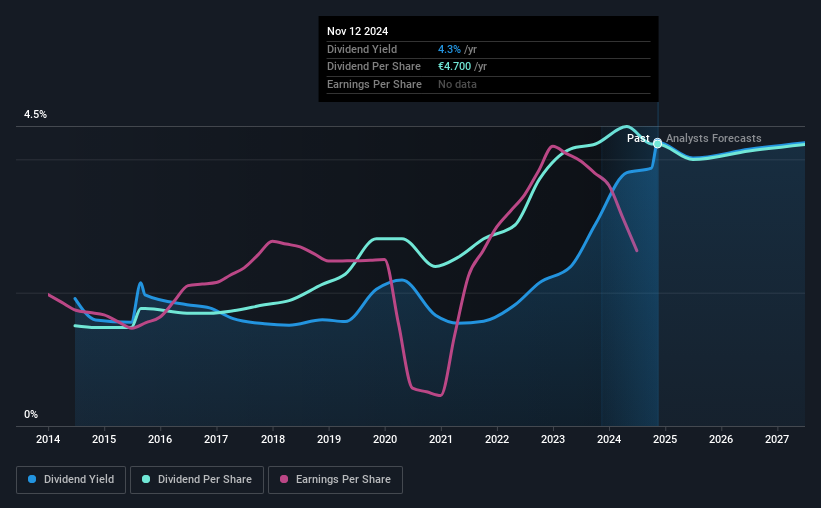Pernod Ricard SA's (EPA:RI) investors are due to receive a payment of €2.35 per share on 27th of November. The dividend yield of 4.3% is still a nice boost to shareholder returns, despite the cut.
Check out our latest analysis for Pernod Ricard
Pernod Ricard's Future Dividend Projections Appear Well Covered By Earnings
While it is great to have a strong dividend yield, we should also consider whether the payment is sustainable. At the time of the last dividend payment, Pernod Ricard was paying out a very large proportion of what it was earning and 124% of cash flows. Paying out such a high proportion of cash flows can expose the business to needing to cut the dividend if the business runs into some challenges.
Looking forward, earnings per share is forecast to rise by 45.3% over the next year. Under the assumption that the dividend will continue along recent trends, we think the payout ratio could be 62% which would be quite comfortable going to take the dividend forward.

Dividend Volatility
While the company has been paying a dividend for a long time, it has cut the dividend at least once in the last 10 years. The annual payment during the last 10 years was €1.67 in 2014, and the most recent fiscal year payment was €4.70. This means that it has been growing its distributions at 11% per annum over that time. Pernod Ricard has grown distributions at a rapid rate despite cutting the dividend at least once in the past. Companies that cut once often cut again, so we would be cautious about buying this stock solely for the dividend income.
Pernod Ricard May Find It Hard To Grow The Dividend
Given that the dividend has been cut in the past, we need to check if earnings are growing and if that might lead to stronger dividends in the future. Although it's important to note that Pernod Ricard's earnings per share has basically not grown from where it was five years ago, which could erode the purchasing power of the dividend over time. There are exceptions, but limited earnings growth and a high payout ratio can signal that a company has reached maturity. That's fine as far as it goes, but we're less enthusiastic as this often signals that the dividend is likely to grow slower in the future.
The Dividend Could Prove To Be Unreliable
Overall, it's not great to see that the dividend has been cut, but this might be explained by the payments being a bit high previously. The track record isn't great, and the payments are a bit high to be considered sustainable. This company is not in the top tier of income providing stocks.
Investors generally tend to favour companies with a consistent, stable dividend policy as opposed to those operating an irregular one. At the same time, there are other factors our readers should be conscious of before pouring capital into a stock. Case in point: We've spotted 3 warning signs for Pernod Ricard (of which 1 is potentially serious!) you should know about. Looking for more high-yielding dividend ideas? Try our collection of strong dividend payers.
New: Manage All Your Stock Portfolios in One Place
We've created the ultimate portfolio companion for stock investors, and it's free.
• Connect an unlimited number of Portfolios and see your total in one currency
• Be alerted to new Warning Signs or Risks via email or mobile
• Track the Fair Value of your stocks
Have feedback on this article? Concerned about the content? Get in touch with us directly. Alternatively, email editorial-team (at) simplywallst.com.
This article by Simply Wall St is general in nature. We provide commentary based on historical data and analyst forecasts only using an unbiased methodology and our articles are not intended to be financial advice. It does not constitute a recommendation to buy or sell any stock, and does not take account of your objectives, or your financial situation. We aim to bring you long-term focused analysis driven by fundamental data. Note that our analysis may not factor in the latest price-sensitive company announcements or qualitative material. Simply Wall St has no position in any stocks mentioned.
About ENXTPA:RI
Undervalued with proven track record and pays a dividend.
Similar Companies
Market Insights
Community Narratives




